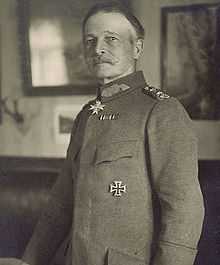Hans von Gronau
| Hans von Gronau | |
|---|---|
 Hans von Gronau during WWI | |
| Born |
6 December 1850 Alt Schadow, Kingdom of Prussia |
| Died |
22 February 1940 (aged 89) Potsdam, Germany |
| Allegiance |
|
| Service/branch | Heer |
| Years of service | 1869–1919 |
| Rank | General of Artillery |
| Commands held |
|
| Battles/wars | World War I |
| Awards | Pour le Mérite with Oak Leaves |
| Relations | Wolfgang von Gronau |
Hans von Gronau (6 December 1850 in Alt Schadow – 22 February 1940 in Potsdam) was a Prussian officer, and General during World War I.
World War I
At the outbreak of World War I, Gronau was recalled from retirement to take command of the newly formed IV Reserve Corps as part of the 1st Army, which was on the right wing of the forces that invaded France and Belgium as part of the Schlieffen Plan offensive in August 1914. It played a significant part in the First Battle of the Marne.[1]
In September 1915, Gronau was appointed to command of XXXXI Reserve Corps (swapping places with Generalleutnant Arnold von Winckler). The Corps was upgraded to form Armee-Gruppe Gronau on 20 September 1915. Gronau remained in concurrent command of the Corps and the Armee-Gruppe. It served with the Army of the Bug throughout its existence. On 18 September 1916 it was raised to the status of an Armee-Abteilung (Army Detachment).[2] It remained on the Eastern Front until dissolved on 27 March 1918.[3]
On 4 October 1916 he was awarded the Pour le Mérite for military bravery. He was awarded the Oakleaves (signifying a second award) on 6 August 1918.[4]
Family
On 23 February 1890 Gronau married Luise Gerischer (20 July 1867 – 25 June 1926). The marriage produced three sons. His oldest son was the flight pioneer Wolfgang von Gronau who crossed the Atlantic Ocean from East to West flying a Dornier Wal D-1422 landing in the Hudson River on 26 August 1930.
Awards
- Iron Cross (1870) II class
- Iron Cross (1914) I class
- Pour le Mérite (4 October 1916) and Oak Leaves (6 August 1918)
- Order of the Red Eagle I class with Oak Levaes
- Order of the Crown I class
Glossary
- Armee-Abteilung or Army Detachment in the sense of "something detached from an Army". It is not under the command of an Army so is in itself a small Army.[5]
- Armee-Gruppe or Army Group in the sense of a group within an Army and under its command, generally formed as a temporary measure for a specific task.
- Heeresgruppe or Army Group in the sense of a number of armies under a single commander.
References
- ↑ "Hans von Gronau". The Prussian Machine. Retrieved 23 December 2012.
- ↑ Cron 2002, p. 86
- ↑ Cron 2002, p. 85
- ↑ "Orden Pour le Mérite". Retrieved 23 December 2012.
- ↑ Cron 2002, p. 84
Bibliography
- Cron, Hermann (2002). Imperial German Army 1914-18: Organisation, Structure, Orders-of-Battle [first published: 1937]. Helion & Co. ISBN 1-874622-70-1.
- Hildebrand, Karl-Friedrich; Zweng, Christian (1999). Die Ritter des Ordens Pour le Mérite des I. Weltkriegs, Band 1: A-G. Biblio Verlag, Osnabrück, Germany. ISBN 3-7648-2505-7.
| Military offices | ||
|---|---|---|
| Preceded by New Formation |
Commander, IV Reserve Corps 2 August 1914-11 September 1915 |
Succeeded by Generalleutnant Arnold von Winckler |
| Preceded by Generalleutnant Arnold von Winckler |
Commander, XXXXI Reserve Corps 11 September 1915 - End of World War I |
Succeeded by Dissolved |
| Preceded by New Formation |
Commander, Armee-Gruppe Gronau 20 September 1915 - 18 September 1916 |
Succeeded by Upgraded to Armee-Abteilung Gronau |
| Preceded by Upgraded from Armee-Gruppe Gronau |
Commander, Armee-Abteilung Gronau 18 September 1916 - 27 March 1918 |
Succeeded by Dissolved |
|